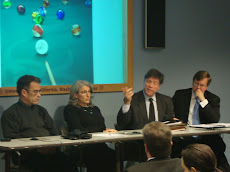skip to main |
skip to sidebar
In a final vote of no confidence, Ireland’s ill-fated e-voting machines are finally headed to the scrap heap.
THE Government has sold the infamous €54m e-voting machines for scrap -- for €9.30 each. [Sold as scrap for about 15 cents per ten dollars spent on their purchase.]
A huge fleet of trucks will begin removing the 7,500 machines from 14 locations on Monday.
They will be taken to a Co Offaly recycling company, KMK Metals Recycling Ltd in Tullamore, where they will be stripped down and shredded.
Ironically, the owner of the firm, Kurt Kyck, cast his vote on one of the machines in the 2002 elections. He has now paid €70,000 for the lot.
Scrapping the machines brings to an end the embarrassing e-voting debacle which has cost the taxpayer more than €54m since it emerged the expensive equipment was faulty.
They could not be guaranteed to be safe from tampering. And they could not produce a printout so that votes/results could be double-checked...
But the voting machines still being used in the USA have identical problems. Even the Voice of America has reported on the ease of hacking our votes.
"We believe that a very resourceful 12 to 13-year-old would be able to essentially produce these alien electronics that can hijack the machine," said Roger Johnston. Roger Johnston heads up Argonne National Laboratory’s Vulnerability Assessment Team.
"I think our view of the voting machines we’ve looked at is that there really isn’t much security thought put into these devices," he said.
Johnston says security concerns are not isolated to the way the machines are made.
"Often the warehouses where these machines are stored have fairly weak security, but almost universally, these machines are transported by third party low bid trucking companies, where there’s no background checks on these individuals," said Johnston. "Often the machines arrive at a polling place and there’s no one to sign for them or to take responsibility for their oversight. So there’s often quite a period of time when these machines could be tampered with."
ABC News covered this topic in 2006:
Princeton University researchers using an Accuvote TS -- a touch screen version of the Diebold machine -- showed how easy it would be to deploy a virus that would, in seconds, flip the vote of any election...
"We're taking the vote-counting process and we're handing it over to these companies -- and we don't know what happens inside these machines," said Edward Felten, a professor and a researcher at Princeton's Center for Information Technology Policy, which ran the study...
Machines malfunctioned in Texas, where 100,000 votes were added.
In California, directions for voters with vision problems came out in Vietnamese.
And in Maryland, screens froze and memory cards went missing.
Gov. Robert Ehrlich, a Republican running for reelection, advised residents to vote by absentee ballot because he had no confidence in the machines.
"I don't care if we paid half a billion dollars or $1 billion," Ehrlich said. "If it's going to put the election at risk, there's no price tag for a phony election or a fraudulent election..."










No comments:
Post a Comment